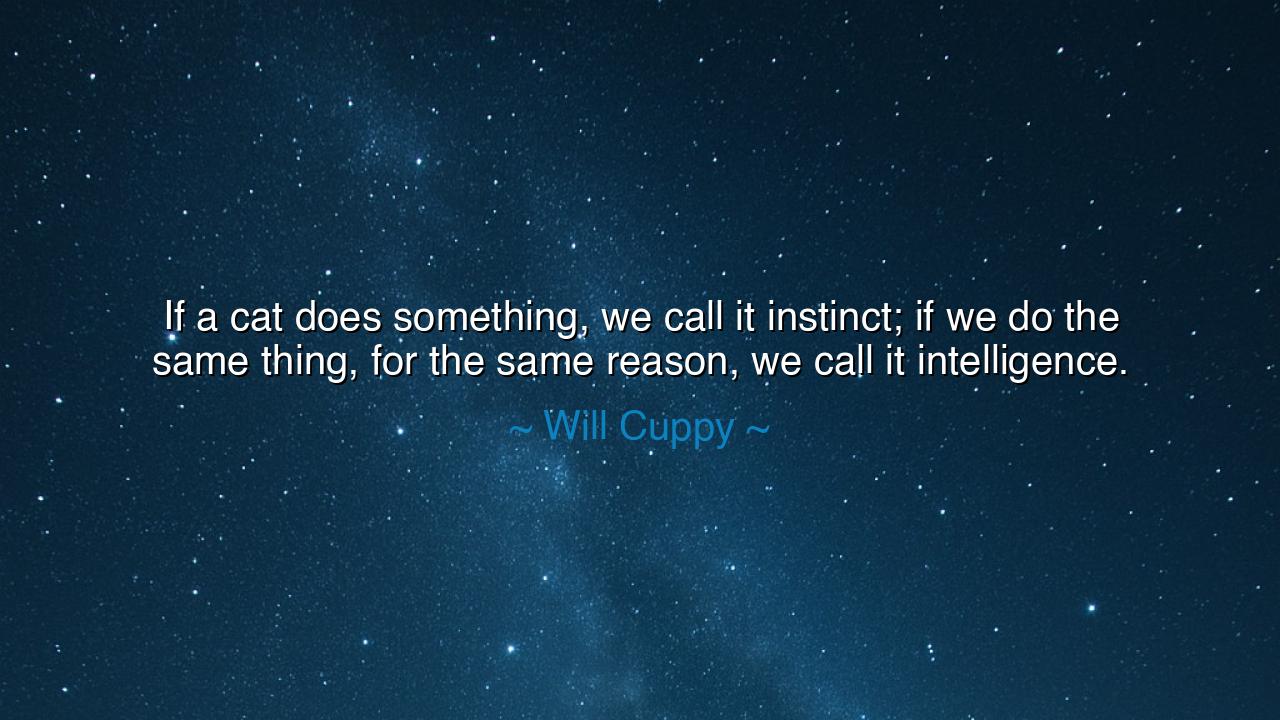
If a cat does something, we call it instinct; if we do the same
If a cat does something, we call it instinct; if we do the same thing, for the same reason, we call it intelligence.






The words of Will Cuppy, “If a cat does something, we call it instinct; if we do the same thing, for the same reason, we call it intelligence,” shimmer with quiet irony and timeless truth. Beneath their humor lies a profound reflection on the nature of human pride, the vanity of knowledge, and the fragile boundary between instinct and intelligence. Cuppy, a master of satire, cloaks his wisdom in jest, but his meaning runs deep: mankind, in its arrogance, often mistakes self-awareness for superiority, when in truth, much of what we call intelligence is simply instinct dressed in reason’s clothing. His words remind us that humility is the beginning of understanding—that to be wise is first to know how little we differ from the creatures we claim dominion over.
To understand the origin of this quote, one must look into the life and mind of Will Cuppy, an American humorist and essayist of the early twentieth century. Known for his sharp wit and his ability to find profound truths in the absurdities of life, Cuppy wrote about history, nature, and the human condition with a tone both skeptical and compassionate. He observed how man’s vanity shapes his view of the world—how we elevate our own behavior to the status of intelligence, while dismissing the actions of animals as mere instinct. Through his humor, he exposes the illusion of human exceptionalism, revealing that the same drives that move the cat to hunt, the bird to migrate, or the ant to build, also move us to survive, to create, to love, and to seek meaning. The difference, he implies, lies not in kind but in perspective.
Cuppy’s insight echoes the wisdom of the ancients. The Greek philosopher Aristotle once said that all living beings strive toward their own perfection—each guided by a natural principle of movement and purpose. What man calls “instinct” in animals is the same guiding principle he honors as “intelligence” in himself. The lion hunts to live, the man toils to earn; the bird builds its nest, the man constructs his home; the mother cat guards her young, the human mother shields her child. The difference is not in the act, but in the language with which we describe it. We exalt ourselves by naming our impulses “thought” and others’ “instinct,” forgetting that both are reflections of the same universal intelligence that flows through all life.
Consider the story of Jane Goodall, the great naturalist who lived among chimpanzees in the forests of Tanzania. When she first observed chimpanzees crafting tools to fish for termites, the scientific community was shaken. Until then, tool-making had been considered a mark of human intelligence—a defining boundary between “man” and “beast.” But the chimps, without speech or written word, had shown purpose, creativity, and foresight. Goodall’s discovery did more than redefine primatology—it humbled humanity. It revealed that what we call intelligence is not confined to us alone; it exists in many forms, woven into the tapestry of life. Her story brings Cuppy’s humor into sharp relief: perhaps the difference between instinct and intelligence is not a matter of fact, but of perspective and pride.
In truth, Cuppy’s words are not a mockery of mankind, but a call to humility. He reminds us that reason is not the sole province of humans, and that our greatness lies not in separation from nature, but in harmony with it. We, too, are creatures of the earth—moved by hunger, love, fear, and desire. Our inventions, our civilizations, our philosophies, all sprout from the same soil that grows the forest and feeds the beasts. When we forget this, we grow arrogant; when we remember it, we grow wise. For the mind that sees itself as master of creation becomes blind, but the mind that sees itself as part of creation learns compassion.
The deeper lesson here is that intelligence, stripped of humility, becomes folly. We build machines that mimic our thought, yet we fail to understand our own hearts. We reach toward the stars, yet neglect the wisdom of the soil beneath our feet. The cat acts with instinct, but so do we—only we justify it with reason and call it brilliance. The true mark of wisdom, Cuppy implies, is not the denial of instinct, but its recognition—the ability to see in our desires, our fears, and our choices, the same sacred fire that animates all living things.
So, my listener, let this teaching settle in your soul: do not mistake pride for wisdom, nor reason for superiority. When you watch the cat stretch in the sunlight or the bird take flight, remember that you are witnessing another expression of the same divine intelligence that beats within your own heart. The line between instinct and intellect is not a wall but a mirror; and when you gaze into it, you are meant not to boast, but to wonder. Learn, then, from all that breathes. Observe nature not as a conqueror, but as a student. For the humble mind that sees kinship with all creation becomes not smaller, but greater—it joins the eternal harmony of life, where instinct and intelligence are one and the same, and both are sacred.






AAdministratorAdministrator
Welcome, honored guests. Please leave a comment, we will respond soon